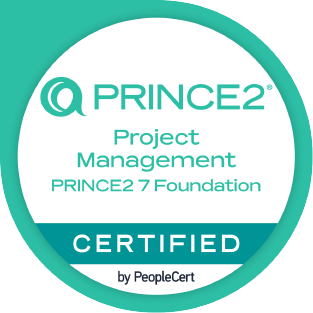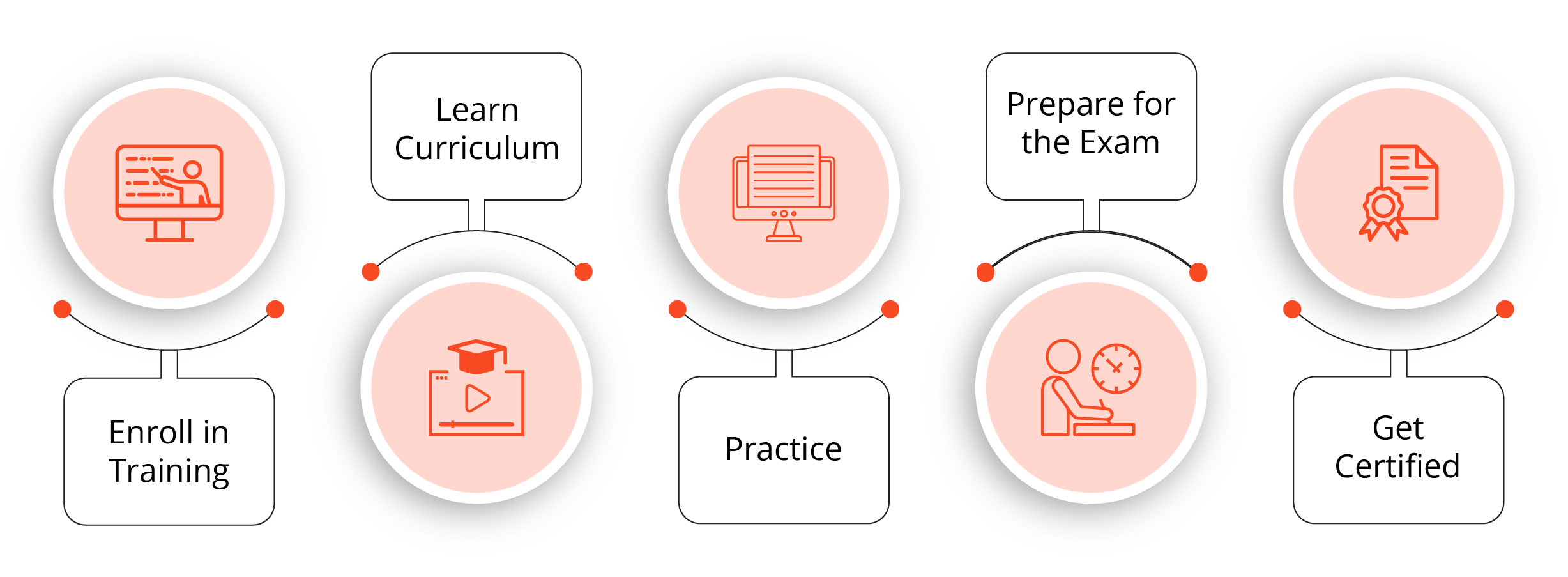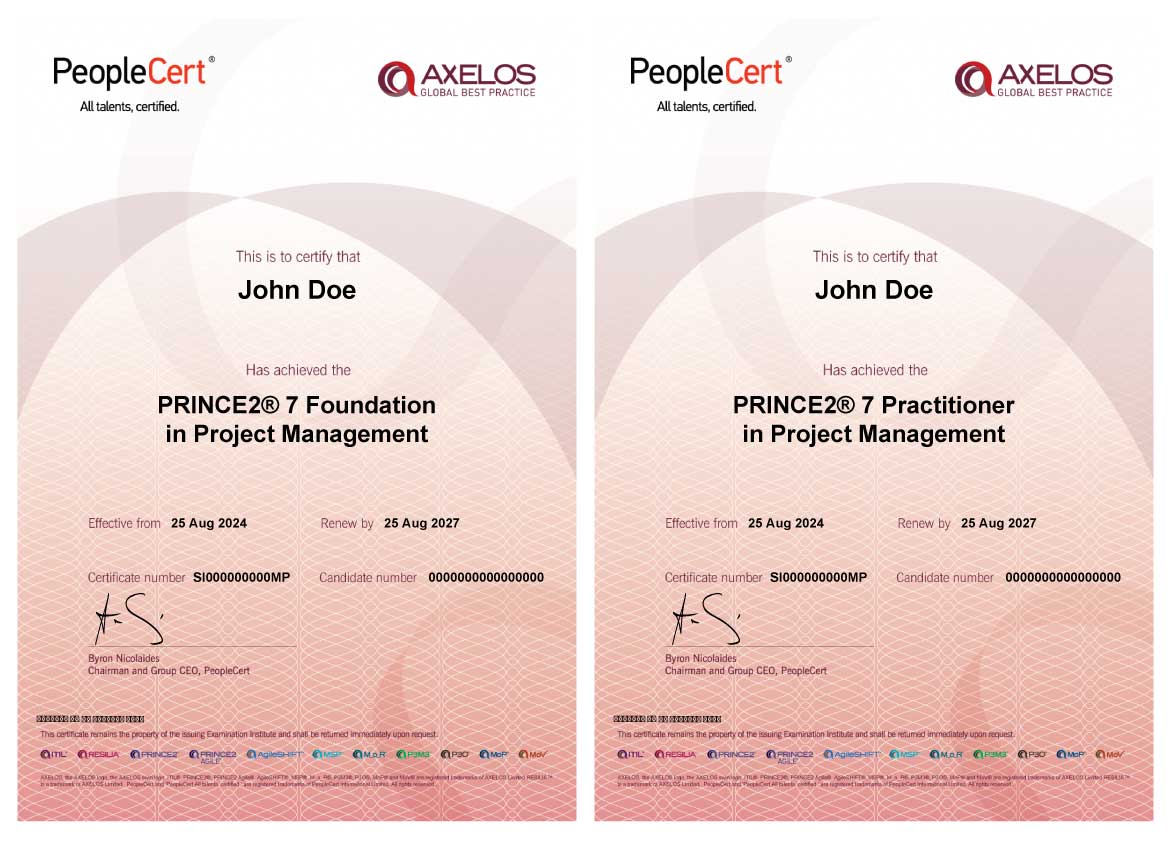

PeopleCert Accredited Training Organization
PRINCE2 Foundation and Practitioner Certification Training in Sydney
PRINCE2 Foundation and Practitioner Certification Training in Sydney
The Most Comprehensive Certification Course for Guaranteed Career Success
2K+ Enrolled
Accredited by
_1733899445_1737031453.png)

_1734441416_1737031453.png)
PRINCE2, a proven project management methodology, ensures efficient resource management and streamlined processes for project success.. The PRINCE2 Foundation and Practitioner training equips aspiring project managers with the skills to optimize project delivery, leading to successful outcomes. This scalable framework, covered in the PRINCE2 Foundation and Practitioner Certification Training, can be tailored to any project, making it a valuable asset.
Read more...Accredited by
_1733899445_1737031453.png)

_1734441416_1737031453.png)
PeopleCert Accredited Training Organization
PRINCE2 Foundation and Practitioner Certification Training in Sydney

5.0
2K+ Enrolled
The Most Comprehensive Certification Course for Guaranteed Career Success
PRINCE2, a proven project management methodology, ensures efficient resource management and streamlined processes for project success.. The PRINCE2 Foundation and Practitioner training equips aspiring project managers with the skills to optimize project delivery, leading to successful outcomes. This scalable framework, covered in the PRINCE2 Foundation and Practitioner Certification Training, can be tailored to any project, making it a valuable asset.
Read more...Accredited by
_1733899445_1737031453.png)

_1734441416_1737031453.png)
PRINCE2, a proven project management methodology, ensures efficient resource management and streamlined processes for project success.. The PRINCE2 Foundation and Practitioner training equips aspiring project managers with the skills to optimize project delivery, leading to successful outcomes. This scalable framework, covered in the PRINCE2 Foundation and Practitioner Certification Training, can be tailored to any project, making it a valuable asset.
Read more...
Guaranteed to Run Workshops

Expert-Led Study Sessions

Networking Opportunities

Flexible Monthly Payment Plans

Real-World Case Studies

Hands-On Project Experience
Request More Details
450K+
Professionals trained
250+
Workshops every month
30+
Trainers
450K+
Professionals trained
250+
Workshops every month
20+
Trainers
Course Overview
PRINCE2 Foundation and Practitioner is a globally-recognized certification in project management used in both the private and public sectors. PRINCE2 training enhances the capabilities to execute a project in a PRINCE2 environment, thereby validating your skills to take up the role of a senior project manager. In this PRINCE2 Foundation and Practitioner certification training, you'll learn how to customize projects based on the particular environment, make a product-based plan for projects, control the resources that are being used, and eliminate project risk.
The PRINCE2 course makes you proficient in various aspects of project management such as communication between management and stakeholders, controlled start and closure of the project, regular reviews on project status, breakdown of project in manageable chunks, and how to delegate, monitor and control the project. PRINCE2 uses a common language, systems, and procedures which makes it a widely popular methodology in project management.
As per the updated guidelines for PRINCE2 Foundation and Practitioner Certification Training, each training session includes mandatory certifications issued by Axelos® / Peoplecert®. Given this prerequisite, Simpliaxis emerges as a top choice to meet your PRINCE2 Foundation and Practitioner Certification Training requirements. PRINCE2 can be tailored according to the project needs irrespective of the type of industry, methods used, or project size.
Also, explore:PRINCE2 Certification Levels

PRINCE2® F&P Training Highlights
4 Days Of Live, Instructor-Led Sessions By Authorized Trainers
Course Based On The Latest PRINCE2 7Th Edition
Earn 32 Professional Development Units (PDUs)
Peoplecert Official Ebook And Training Material
Course Cost Includes the Exam Fee For PRINCE2 Foundation and Practitioner Certification
Doubt Clearing Sessions
24/7 Support And Learning Assistance

Career upliftment


Unsure about your prep?

Benefits focused on Individuals and corporate
Common attendees
Project Managers
Team Members
Aspiring Project Managers
Project Support Staff
Agile Coaches
Business Analysts
Scrum Master
Executives and Senior Managers

Prerequisites for PRINCE2® F&P certification training
PRINCE2 Foundation and Practitioner Certification Eligibility Criteria:

Enroll:
Start your PRINCE2 Foundation and Practitioner training with Simpliaxis.
Learn:
Gain expertise from industry leaders via live classes.
Practice:
Apply knowledge through real-world case studies.
Prepare:
Assess readiness with mock exams.
Certify:
Pass the exam and become a PRINCE2 practitioner.

Get the PRINCE2® F&P Certification

Curriculum
Course Curriculum
What you will learn in this PRINCE2® F&P workshop
Overall Understanding of PRINCE2
PRINCE2 Foundation and Practitioner Certification Training provides a thorough understanding of PRINCE2 and how to complete a project lifecycle using its blueprint.
Efficient People Management
This training emphasizes the importance of efficient people management and teaches how to strategize and deliver successful projects by building effective teams.
Choosing the right people for the Project:
PRINCE2 Foundation and Practitioner training helps you identify individuals with the right skills and knowledge, ensuring effective contributions to teams and projects.
Foundational Project Concepts:
Gain a basic understanding of the essential concepts of PRINCE2 and project management, laying a solid foundation for successful project execution.
Risk Management Capabilities:
PRINCE2 Foundation and Practitioner Certification Training enhances your ability to identify, manage, and eliminate risks effectively using PRINCE2 strategies.
Learn Customization:
Expand your knowledge and enhance your ability to tailor the PRINCE2 framework to the specific requirements of each project.
Stakeholder Engagement:
Learn how to effectively engage and manage stakeholders throughout the project lifecycle, ensuring their needs are met and support is maintained.
Quality Management:
PRINCE2 Foundation and Practitioner training teaches you how to define and achieve project quality requirements, ensuring deliverables meet stakeholder expectations.
Change Control:
Learn how to effectively manage changes within a project, ensuring that they are properly assessed, authorized, and implemented without derailing the project's overall objectives.
Project Governance:
Understand the importance of effective project governance and how PRINCE2 helps establish clear roles and responsibilities, ensuring projects are managed within agreed-upon parameters.

40+ Certification programs made an impact
Employee retention improved by 45%
Work satisfaction and capabilities improved by 30% on an average
100+
Clients













PRINCE2® F&P Certification Course For Corporates
With learning targeted to your unique team environment, we at SimpliAxis help to resolve your specific issues and meet your specific needs with tailored training methods. We offer corporate training globally to keep Organizations up to date by building the knowledge gap required and make them strive in the competitive world with the right skills according to the industry needs.

Our Customer words for us
Meet the Team That's Invested in Your Success
What do you mean by PRINCE2 certification?
Is PRINCE2 an Open-book exam?
After how many years does the PRINCE2 Foundation and Practitioner Certification need renewal?
What is the exam format for PRINCE2 Foundation Certification?
What is the duration of the Foundation Certification exam?
What is the passing mark for the PRINCE2 Foundation exam?
What is the PRINCE2 Practitioner Certification?
What is the passing mark for the PRINCE2 Practitioner exam?
What is the duration of the PRINCE2 Practitioner exam?
What type of study materials are allowed in Open book format?
What are the PRINCE2 Foundation and Practitioner certifications?
What are the prerequisites to attend the PRINCE2 Foundation and Practitioner certification training?
What are the benefits of the PRINCE2 Foundation and Practitioner Certification Training?
Is PRINCE2 equivalent to PMP certification?
Is PRINCE2® Foundation and Practitioner Certification equivalent to a degree?
PRINCE2 Foundation and Practitioner Training equivalent to PMP?
Is the PRINCE2® Foundation and Practitioner Certification Training hard?
Is PRINCE2 an Open-book exam?
What is the exam format for PRINCE2 Foundation Certification?
What is the duration of the PRINCE2 Foundation Certification exam?
What is the passing mark for the PRINCE2 Foundation exam?
What is the passing mark for the PRINCE2 Practitioner exam?
What is the duration of the PRINCE2 Practitioner exam?
How many chances are there to pass the PRINCE2 Foundation and Practitioner exam?
What happens to my token or partial payment if I don’t enroll immediately?
Is there a preferred currency for payment, especially for international students?
Can payments be made online through your website, or do I need to visit a physical location?
Do you offer any discounts or promotions for early payment?
Can I pay for the course in installments, or is full payment required upfront?
Will I get a refund if I cancel my enrollment?
Where will I get my payment receipt?
Is there any transaction or processing fee?
What cards do you accept?
What payment options are available?
What if I miss a class? Are there any money back options?
If I want to know more about Training, whom should I connect with?
Is there any option to complete the Training in the native language if a participant chooses to?
Can I receive personalized Training at my convenience?
Where do I find the upcoming schedules of my course?
After enrollment, can I change the date of my training class?
Do I get any certificate upon completion of the course?
How do I enroll in the training course?
What are the different courses offered by Simpliaxis?
What are the different modes of Training available for Simpliaxis courses?
Do you offer online Training?
Do you offer corporate Training?
Who are the instructors of my course?
Is there any discount available for the Simpliaxis courses?
Whom do I contact if I have more queries regarding my course?
Are your courses affordable?
Why should I choose Simpliaxis?
What is the object of Simpliaxis?
How much discount will I get if I enroll for the Training?
PRINCE2® F&P Course FAQs
Candidates are allowed to use the official printed hard copy of PRINCE2 7 Managing Successful Projects. The official manual may be explained and arranged, but no sticky notes or other notes are allowed.
During the examination, the candidate can use their Official Core Guidance Paperback Book, If they have one, or their Official Core Guidance eBook.
The PRINCE2 Foundation certification will teach the aspirants the PRINCE2 principles, terminology, and basic concepts related to project management. After completing the certification the professional will become an important member of the team and help in using PRINCE2 methodology in the project environment.
The PRINCE2 Practitioner certifications help the professional understand how to apply PRINCE2 to a project. The qualified professional will be able to apply PRINCE2 strategies to the specific project scenarios.
The following are some of the benefits of the PRINCE2 Foundation and Practitioner Certification:
You can reach out to our experienced career counselor
or email us on support@simpliaxis.com
or contact any of our phone numbers
or you can chat with us anytime
or visit our contact us page https://www.simpliaxis.com/contact-us
Find out why 1,000+ professionals love SimpliAxis
Global Recognition
Every Course is recognized by the most reputable certification organizations globally that ensure credibility and acceptance in all industries.
Expert Trainer
Gain knowledge from trained and experienced trainers who impart real-world business insights as well as practical experience to the classes.
Flexible Learning
Provides a variety of methods of learning, such as classes, online, and corporate Training, that meet the needs of different individuals and their schedules.
Lifetime Access
Enjoy all-year access to the recordings of sessions, course materials, and study tools.
Proven Track Record
A reputable training provider with impressive experience in helping professional and business organizations improve their abilities and meet their career ambitions.
End-to-End Assistance
Simpliaxis Offers ongoing assistance prior to, during, and after Training and includes study material exams, guidance for participants on certification, and career choices.
Interactive and engaging Training
Our Training sessions are designed to be extremely interactive, featuring real-world scenarios with group participation, questions & answers to aid in understanding.
A wide range of courses
Simpliaxis offers various internationally acknowledged certification courses in Agile, Scrum, SAFe, DevOps, Project Management, and more.

Sydney, the capital city of New South Wales, is one of Australia's largest and most dynamic cities. It is renowned for its stunning harbour, iconic landmarks, and vibrant culture. The city is home to a thriving economy and hub for several industries, including finance, tourism, and technology.
According to the latest data from the Australian Bureau of Statistics, the labour force in Sydney stands at approximately 2.5 million people, making it one of the largest labour markets in the country. The city is home to a diverse and skilled workforce, with many professionals, including managers, administrators, and skilled trades workers.
In finance, Sydney is a hub for financial services, including banking, insurance, and investment management. The city is home to several major financial institutions, including the Reserve Bank of Australia, Commonwealth Bank of Australia, and Westpac Banking Corporation. In 2021, the finance sector employed over 110,000 people in Sydney, with a significant percentage of these workers being professionals.
The tourism industry is also a significant contributor to the economy of Sydney, with the city attracting millions of visitors each year. The sector employs over 90,000 people in the town, with a significant proportion of these workers in the hospitality sector, including hotel and restaurant staff.
In recent years, the technology sector in Sydney has been experiencing rapid growth, with the city attracting an increasing number of tech companies and startups. The city is home to several technology hubs, including the Sydney Startup Hub, Australia's most significant co-working space. The tech sector in Sydney employed over 55,000 people in 2021, with a considerable proportion of these workers being software engineers and developers.
In conclusion, the labour force in Sydney is one of the most diverse and skilled in Australia. With a high proportion of professionals in various industries, including finance, tourism, and technology, the city is an attractive location for businesses and job seekers. The steady growth in the number of professionals in the city is a testament to its dynamic and thriving economy.
Our privacy policy © 2018-2026, Simpliaxis Solutions Private Limited. All Rights Reserved